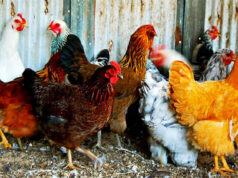The threat of Blackhead Chicken Disease has left many poultry enthusiasts worried about the health of their flocks. This article dives deep into the intricacies of this disease, offering insights that might help in better understanding and managing it.

What is Blackhead Chicken Disease?
Blackhead Chicken Disease, also known as histomoniasis, is an infection caused by the protozoan parasite Histomonas meleagridis. This disease primarily affects turkeys but is also seen in chickens, especially those exposed to environments contaminated by the parasite.

Causes of Blackhead Chicken Disease
The Role of Histomonas Meleagridis
The primary culprit behind Blackhead Chicken Disease is the parasite Histomonas meleagridis. This microorganism invades the digestive tract of chickens, leading to severe inflammation and other complications.
Environmental Factors
The spread of this disease is significantly influenced by environmental factors. Contaminated soil, water, and feed are common sources. Poor sanitation and overcrowded living conditions can exacerbate the spread.

Symptoms of Blackhead Chicken Disease
Initial Signs
Early symptoms include lethargy, reduced appetite, and yellowish diarrhea. Chickens may also display ruffled feathers and drooping wings.
Advanced Symptoms
In advanced stages, chickens develop a darkening of the head, hence the name Blackhead Chicken Disease. Other severe symptoms include liver lesions and a drop in egg production.

Diagnosis of Blackhead Chicken Disease
Diagnosis often requires a combination of clinical observation and laboratory tests. Veterinarians may need to perform fecal examinations and necropsies to confirm the presence of Histomonas meleagridis.
Prevention Strategies
Sanitation Practices
Maintaining cleanliness in poultry housing is critical. Regular cleaning and disinfection can reduce the risk of contamination and infection.
Probiotics and Supplements
Introducing probiotics and specific dietary supplements can bolster the birds’ immune systems, making them more resistant to infections.
Treatment Options
Medications
While no specific medication is universally approved for Blackhead Chicken Disease, some drugs like ronidazole and metronidazole have shown effectiveness in treating infected birds.
Proper Care and Management
Infected birds need to be isolated and provided with supportive care, including a healthy diet and clean water.
Impact on Poultry Farming
The economic impact of Blackhead Chicken Disease on poultry farming can be significant. Losses can stem from reduced egg production, increased mortality, and costs associated with treatment and prevention.
Case Studies
Example 1: Small Farm in Midwest USA
A family-run farm in Midwest USA reported an outbreak of Blackhead Chicken Disease. Through stringent biosecurity measures and early diagnosis, they managed to control the spread and minimize losses.
Example 2: Commercial Poultry Farm in Europe
A large commercial farm in Europe experienced a severe outbreak, leading to substantial losses. Implementation of advanced treatment protocols and improved sanitation practices significantly mitigated future risks.
Latest Research and Developments
Ongoing research aims to better understand Blackhead Chicken Disease and develop more effective preventive and treatment methods. Innovations in poultry farming practices also play a crucial role in disease control.
The Future of Poultry Farming
With advancements in veterinary medicine and improved farming practices, the future looks promising for controlling Blackhead Chicken Disease. Collaboration between researchers, farmers, and industry stakeholders is vital to achieving this goal.
Conclusion
Understanding and managing Blackhead Chicken Disease is crucial for the health and productivity of poultry flocks. By staying informed and adopting best practices, poultry enthusiasts can ensure that their birds remain healthy and thrive.
Frequently Asked Questions (FAQs)
What is Blackhead Chicken Disease?
Blackhead Chicken Disease, or histomoniasis, is an infection caused by the protozoan parasite Histomonas meleagridis that affects poultry.
How can I prevent Blackhead Chicken Disease?
Maintaining good sanitation practices, providing appropriate care, and ensuring a balanced diet with supplements can help prevent the disease.
Is Blackhead Chicken Disease treatable?
There are no universally approved medications, but drugs such as ronidazole and metronidazole have shown effectiveness. Early diagnosis and proper management are vital.
For more information on poultry diseases, you can visit the Mississippi State University Extension.
As an Amazon Associate, I earn from qualifying purchases.
Check out these related articles for more insights: Green Muscle, Disease Symptoms, and Marek’s Disease.










